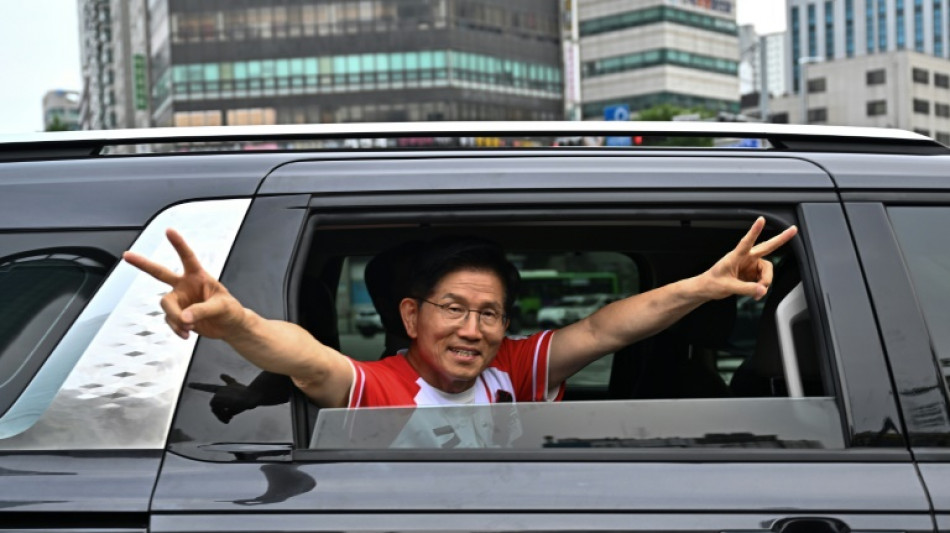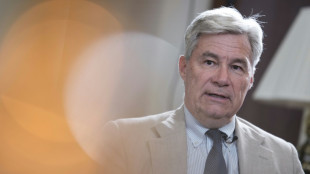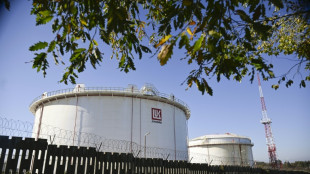
| JRI | 0.1% | 13.65 | $ | |
| SCS | 0.51% | 15.7 | $ | |
| AZN | 0.55% | 89.1 | $ | |
| CMSC | -0.04% | 23.82 | $ | |
| BCC | -0.2% | 69.04 | $ | |
| NGG | -0.92% | 77.38 | $ | |
| GSK | -1.15% | 47.18 | $ | |
| BTI | -0.65% | 54.13 | $ | |
| BP | 1.48% | 36.53 | $ | |
| RIO | -0.58% | 70.63 | $ | |
| CMSD | 0.61% | 23.99 | $ | |
| BCE | -1.23% | 22.83 | $ | |
| RBGPF | -3.73% | 75.65 | $ | |
| RYCEF | -3.09% | 14.55 | $ | |
| RELX | -0.22% | 41.33 | $ | |
| VOD | -0.73% | 12.32 | $ |
S. Korea's conservative contender Kim Moon-soo emerges from Yoon's shadow

When his conservative South Korean party bowed to show remorse for ex-president Yoon Suk Yeol's disastrous martial law decree, Kim Moon-soo sat alone and resolute in symbolic non-apology.
The moment catapulted the labour activist-turned-lawmaker to fame that he now hopes to harness to become South Korea's next president.
"He's essentially a presidential candidate that social media gave birth to," Jeongmin Kim, executive director at the Korea Risk Group, told AFP.
Internet users dubbed him "stubborn Moon-soo" in approval of the move, which helped drive a small uptick in his beleaguered party's approval ratings.
Yet the People Power Party (PPP) -- Yoon's former party -- wasn't always so keen on Kim Moon-soo's candidacy.
The PPP selected, unselected, and then selected him again as its nominee in a high-profile bout of infighting.
It was symbolic of the turbulence that has rocked the party since Yoon's botched bid to suspend civilian rule in December.
On the campaign trail, Kim, 73, has sought to distance himself from the ousted president, who became the second conservative leader to be stripped of office, after Park Geun-hye in 2017.
Kim offered his first apology "to the people suffering from the consequences of martial law" last month.
"Martial law has not only made the economy and domestic politics difficult but has also caused significant challenges in exports and diplomatic relations," he told South Korean media.
Korea Risk Group's Jeongmin Kim called the PPP's candidate a "chameleon-like politician capable of political survival".
- Shift to the right -
Born into a large family in North Gyeongsang province, about 300 kilometres (185 miles) from Seoul, Kim grew up in poverty after his father's co-signing of a loan plunged them into debt.
Kim was politically active by his final year of high school, when he was suspended for protesting against military leader President Park Chung-hee.
He attended South Korea's most prestigious university but started working in factories while studying for his degree and organising labour unions.
He was arrested twice in the 1980s, first on charges of violating the Anti-Communism Law, and later under the National Security Act.
Kim spent more than two-and-a-half years in prison and wrote in his biography about enduring electric shock and water torture.
He was pardoned in 1988 and was stunned to find the country thriving.
"My prediction that South Korean capitalism would eventually fail proved wrong," Kim wrote in his biography, with the collapse of the Soviet Union also upending his world view and leading him to join the conservative party.
Kim was elected to parliament in 1996 and later served two terms as governor of Gyeonggi province, South Korea's most populous region.
After being accused but not charged in an abuse of power scandal in 2011, Kim found his footing again among hard-right conservatives.
His popularity with his party's hard line was bolstered by his attempt to revise history textbooks in ways seen as favourable to former colonial power Japan, plus a high-profile fine for attending a church service during the Covid-19 pandemic.
He was appointed labour minister by Yoon in 2024 and was widely seen as part of the disgraced leader's inner circle.
- 'Written a miracle' -
Polls showed Kim trailing by at least 10 percentage points behind the opposition leader Lee Jae-myung and he was unable to convince third-place candidate, Lee Jun-seok of the Reform Party, to merge forces and make the election competitive.
With polls opening on Tuesday, "the question is to what extent can candidate Kim Moon-soo narrow the gap", said Heo Jin-jae, research director at Gallup Korea.
"Any remarks that offend public sentiment could cost the candidates votes," Heo said.
Another key question is whether he can win over moderates.
"The conservative base in South Korea is ideologically broad and Kim Moon-soo's political character is quite distinct," Kang Joo-hyun, a professor at Sookmyung Women's University, told AFP.
"Among moderates or pragmatists on the right, there's hesitation about whether they can fully back him," said Kang.
In response to the sceptics, Kim recently recalled his last-minute victory in 1996, when he successfully ran for parliament.
"You didn't think I would become the (final) candidate, did you? Neither did I," Kim told reporters on his first day of campaigning.
"But we have written a miracle."
P.Hwang--SG

 London
London

 Manchester
Manchester
 Glasgow
Glasgow
 Dublin
Dublin
 Belfast
Belfast
 Washington
Washington
 Denver
Denver
 Atlanta
Atlanta
 Dallas
Dallas
 Houston Texas
Houston Texas
 New Orleans
New Orleans
 El Paso
El Paso
 Phoenix
Phoenix
 Los Angeles
Los Angeles


